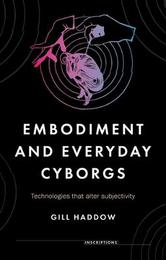
|
Embodiment and Everyday Cyborgs: Technologies That Alter Subjectivity
Hardback
Main Details
| Title |
Embodiment and Everyday Cyborgs: Technologies That Alter Subjectivity
|
| Authors and Contributors |
By (author) Gill Haddow
|
| Series | Inscriptions |
|---|
| Physical Properties |
| Format:Hardback | | Pages:208 | | Dimensions(mm): Height 216,Width 138 |
|
| Category/Genre | Impact of science and technology on society
Artificial intelligence |
|---|
| ISBN/Barcode |
9781526114181
|
| Classifications | Dewey:610.28 |
|---|
| Audience | | Tertiary Education (US: College) | | Professional & Vocational | | General | |
|---|
| Illustrations |
2 black & white figures; 2 tables
|
|
Publishing Details |
| Publisher |
Manchester University Press
|
| Imprint |
Manchester University Press
|
| Publication Date |
25 May 2021 |
| Publication Country |
United Kingdom
|
Description
Implanting the human body with human/animal organs or implantable devices not only changes what you are but also changes who you are. If you were in need of an organ transplant, would you prefer organs from other humans or non-human animals, or would you choose a 'cybernetic' medical implant? Using a range of social science methods and drawing on the sociology of the body, biomedicine and technology, this book asks whether alterations in subjectivity are reported from organ transplant recipients in cases of non-human animal transplants and implantable devices. Haddow interviews those who live with 'mechanical implants' in the form of 'implantable cardiac devices' in order to understand what changes, if any, had occurred. She concludes that the reliance on 'cybernetic' medical devices create 'everyday cyborgs' who can experience alienation from the mechanical implant at implantation and activation. Embodiment and everyday cyborgs invites readers to consider the relationship between personal identity and the body, between humans and non-human animals, and our increasing dependency on 'smart' implantable technology. The creation of new techno-organic hybrid bodies makes us acutely aware of our own bodies and how ambiguous the experience of embodiment actually is. It is only through understanding how modifications such as transplantation, amputation and implantation make our bodies a 'presence' to us, Haddow argues, that we realise our everyday experience of our bodies as an absence.
Author Biography
Gill Haddow is a Senior Lecturer in Science, Technology and Innovation Studies at the University of Edinburgh -- .
Reviews'The frequency of biomedical interventions-organ transplants, xenotransplants, implantable cardiac devices, 3-D bioprinting-in humans has raised myriads of philosophical and sociological questions about the identity (subjectivity) of the resulting bodies. Haddow ingeniously addresses such questions in this book. Drawing from both theory and empirical evidence, she distinguishes "everyday cyborgs" from the perceived monstrosity of fictional cyborgs. The key question she engages is whether biomedical interventions alter the identity of their human recipients. She cites evidence from selected informants-patients who received organ transplants-that affirm alteration in their thoughts and behaviors. Another group of Haddow's informants report having refused xenotransplants (cross-species organ donations) as "yucky." Most respondents in Haddow's study are more accepting of technologies such as 3-D bioprinting than xenotransplantation, as in the former case, the recipient becomes the donor (having a needed organ "harvested," i.e., bioprinted, from the body). Haddow makes a significant contribution to the sociology of the body, furthering the social-scientific understanding of everyday cyborgs as biomedically enhanced but modified humans and of the impact of techno-organic hybridity on their subjectivity. Students and scholars of bioethics, medical sociology, cyborg anthropology, and STS (science, technology and society) will find this book interesting. Summing Up: Highly recommended. Upper-division undergraduates. Graduate students and faculty. General readers.' T. Niazi, University of Wisconsin, CHOICE (June 2022) -- .
|